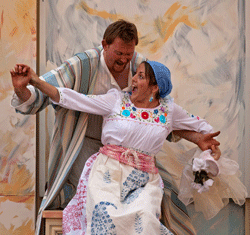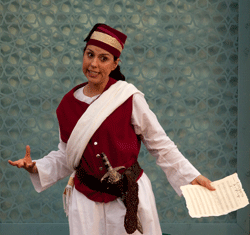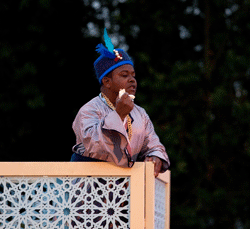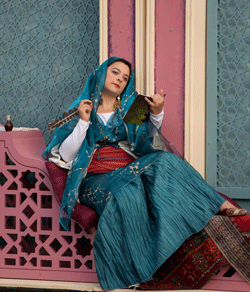Fortunately, Bampton Classical
Opera’s presentation of a ‘rival’ The Marriage of
Figaro, by the little-known Portuguese composer, Marcos Portugal
(1762-1830), was not interrupted by raucous complaints by die-hard Mozartians.
Given its UK première in the Deanery Gardens at Bampton in July this year, this
is believed to be the first production of this witty and effervescent opera
since its première during the Venetian Carnival season of 1800.
Gaetano Rossi’s libretto essentially preserves Da Ponte’s
familiar plot and structure, a fact which is not surprising given that at this
time it was common for libretti to circulate independently of their
accompanying scores. Gilly French’s and Jeremy Gray’s translation
was typically witty and droll, some self-conscious rhymes (fractious/anxious)
and slick one-liners adding to the air of frivolity and recklessness.
 Nicholas Merryweather as Figaro and Emily Rowley Jones as Susanna
Nicholas Merryweather as Figaro and Emily Rowley Jones as Susanna
The plot may be immediately recognisable but the characters wear different
musical costumes. The young cast were uniformly accomplished and committed;
theatrically convincing and consistent, they really entered the spirit of
piece, indulging its light-weight humour but also intimating its darker
currents. There was a spontaneity and freshness about the on-stage
choreography: thus, the ‘parade’ of characters during the overture,
which might have seemed contrived, in fact captured a naturalist
‘busyness’ and sense of domestic intrigue. We were given a series
of miniature cameos — a sort of cinematic role call — immediately
and economically capturing each character’s essential temperament:
Figaro’s confident ingenuity, Susanna’s cleverness, Bartolo’s
grumpiness and the Countess’s quiet gravity.
Performing his second Bampton Figaro (he appeared as Paisiello’s
barber in 2005), Nicholas Merryweather stood out: clear, firm and relaxed of
tone, his diction was superb (no mean feat in this venue) and he exhibited a
musical and dramatic confidence and ease which surely indicate great successes
to come. In his programme notes, David Cranmer explains that, even if Portugal
had been familiar with Mozart’s score, it would not have served as a good
musical model, for his concise arias — with their energetic
accompaniments — would not have provided sufficient opportunity for the
singers to show off their virtuosity. Portugal’s first Susanna was Teresa
Strinasacchi, evidently a soprano of first-rate technique and expansive range;
but Emily Rowley Jones had no difficulty dispatching the demands of
Susanna’s sparkling coloratura. Her intonation was unfailing true and her
tone engaging.
 Joana Seara as Cherubino
Joana Seara as Cherubino
I first saw this production at Bampton Deanery Gardens, in July, a
picturesque outdoor venue which was perfectly placed to capture the ambience of
seductive conspiracy, and I was a little worried how it would transfer to the
confined space at St John’s, with its theatrical restrictions and
limitations. Interestingly, the result was in fact a tighter sense of
theatrical timing and movement. Moreover, some of the characters seemed
positively to benefit from the more intimate stage space — John-Colyn
Gyeantey’s Count, in particular, presenting a much more focused reading
of the role. The rather blundering buffoon-like figure from Bampton was here
replaced by an angrier, more severe Count, of greater musical and dramatic
stature. Previously, I had found his tone rather unyielding, but now he
discovered a weight and compass which greatly enlarged the scope of the part
and enhanced the dramatic tension.
The role of the Countess seems to have been constrained by the technical
limitations of the first interpreter, Rosa Canzoni; and this is a shame as it
would have been nice to have heard more of Lisa Wilson’s sweet, composed
tone, which blended so beautifully with Rowley Jones in their Act 2 duet.
A gamine Joana Seara pouted and cringed as the frustrated, gauche Cherubino,
but while her upper register dazzled, I sensed a slight hard-edge to her tone,
particularly in Act 1. Robert Winslade Anderson bellowed warmly as the
vivacious, mischievous music-master; Basilio’s drunken karaoke to the
pleasures of women was riotously delivered, eliciting the snide put-down,
‘His music’s worse than Mozart …’ from a contemptuous
Figaro. Mark Saberton’s Bartolo and Cara Curran’s Marcellina
completed the gifted cast of principals; and Edmund Connolly (Antonio) and
Caroline Kennedy (his daughter, Cecchina), delivered these minor roles in
charming and accomplished fashion.
 John-Colyn Gyeantey as Count Almaviva
John-Colyn Gyeantey as Count Almaviva
The sets were devised by Jeremy Gray, Mike Wareham and Anthony Hall, and the
lighting design deserves especial mention, with its striking contrasts of
bright complementary shades — deep blue suggesting the seductive light of
the moon against a rich Seville orange evoking the balmy warmth of both the
climate and burgeoning passions; emerald green intimating the cool composure of
the Countess juxtaposed against deep purple suggestive of erotic ‘Turkish
delights’.
The orchestral players were positioned behind the Moorish screens which
effectively portrayed Almaviva’s Andalucian palace, but despite this
placement, the ensemble between stage and ‘pit’ was surprisingly
good; only occasionally did one or two of the singers slightly anticipate
— which was surprising as Robin Newton, conducting the lucid, bright
London Mozart Players, urged the action along at a brisk pace, whirling us
through the first act and establishing an exciting dramatic momentum. Indeed
effectively he revealed the dynamic quality of some of Portugal’s
ensembles, particularly at the end of Act 1 and during the chaotic shenanigans
of the Act 2 sextet.
Leaving the church, one patron was heard to remark, ‘I really
hadn’t expected the music to be so good’. In fact, he should not
have been surprised: Bampton Classical Opera are committed to reviving works of
genuine musical and dramatic value. Their courageous repertoire is meticulously
researched and selected, and thoughtfully and inventively staged.
 Lisa Wilson as Countess Rosina
Lisa Wilson as Countess Rosina
Bampton have give us Paisiello’s Barber and Gazzaniga’s
Don Giovanni (1997 and 2004). What’s to come? A neglected
Così? Portugal’s Figaro is unlikely to replace Mozart’s
barber in the opera-going public’s affection, but his joyful opera is
definitely worth hearing. It may lack the intensity of Mozart’s complex
dramatic ensembles but its chain of charming arias and duets reveals rich
musical resources and engaging invention. It is not merely a
‘curiosity’ but a work of considerable operatic merit — and
it’s a pity that not more of the British opera press were here to enjoy
it.
Bampton Classical Opera perform Thomas Arne’s The Judgement of
Paris and extracts from Alfred at Wotton House, Buckinghamshire
and The Holywell Music Room in November 2010. Gluck’s Il parnasso
confuso will receive its UK première at the Purcell Room, London in June
2011; and at the Buxton Festival 2011 the company will present Cimarosa’s
L’Italiana in Londra.
Claire Seymour
![Marcos Portugal. Anonymous miniature dating c.1790-1795 [Source: Marcos Portugal]](http://www.operatoday.com/Marcos_Portugal.gif)



